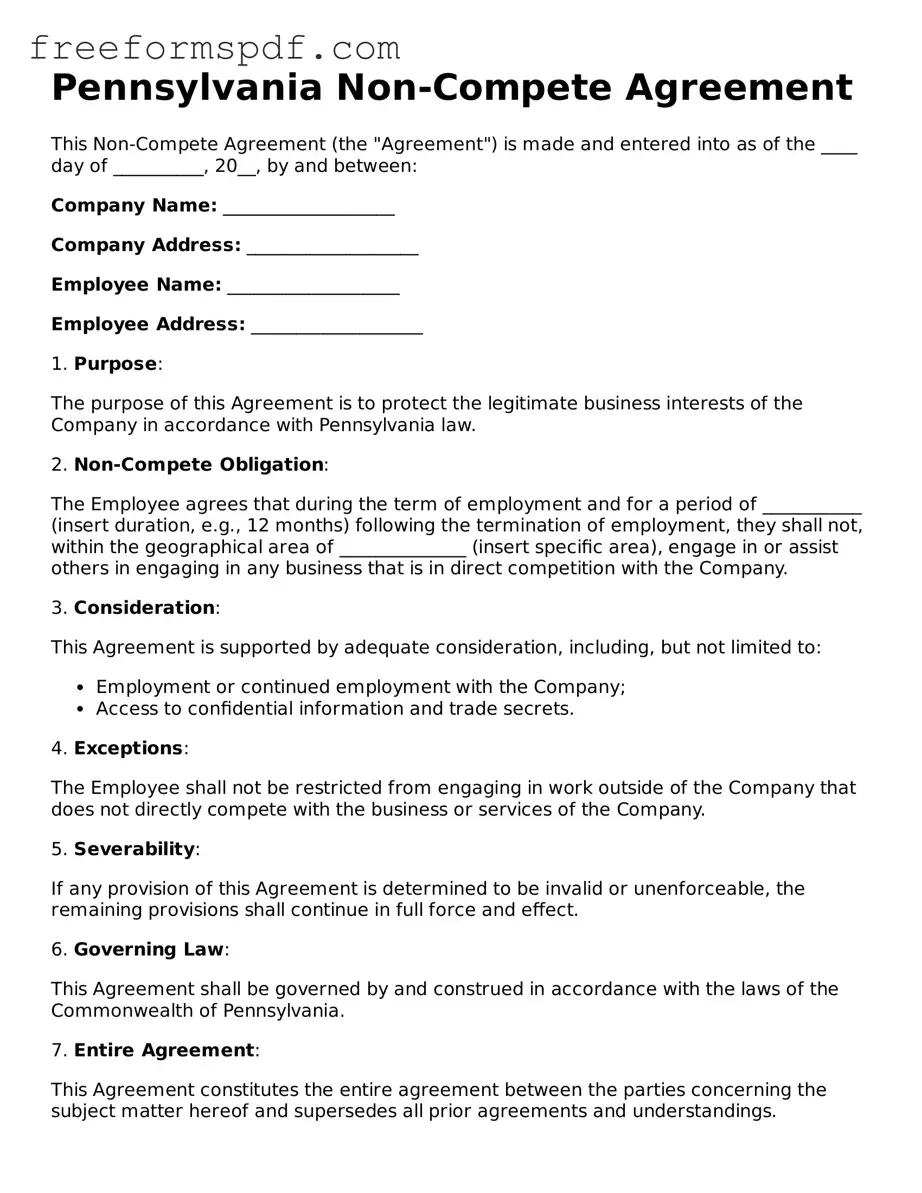Attorney-Verified Non-compete Agreement Document for Pennsylvania State
Common mistakes
-
Not reading the entire agreement: Many people skim through the document without fully understanding the terms. This can lead to agreeing to conditions that may not be favorable.
-
Failing to specify the time frame: The duration of the non-compete clause should be clearly defined. Leaving it vague can lead to disputes later on.
-
Neglecting to outline geographical restrictions: It's important to specify where the non-compete applies. Without clear boundaries, the agreement may be too broad and unenforceable.
-
Overlooking exceptions: Some agreements may include exceptions for certain types of work or clients. Not mentioning these can limit future opportunities unnecessarily.
-
Not considering state laws: Each state has different laws regarding non-compete agreements. Ignoring Pennsylvania's specific regulations can lead to issues in enforcement.
-
Inadequate compensation: If the agreement does not provide adequate consideration, it may be deemed unenforceable. Compensation should be fair and clearly stated.
-
Using vague language: Ambiguous terms can lead to misunderstandings. Clear and precise language is crucial for both parties to understand their obligations.
-
Not seeking legal advice: Failing to consult with a legal professional can result in overlooking important details. It's always wise to get expert guidance.
-
Signing without negotiation: Some individuals accept the terms as-is without negotiating. This can lead to unfavorable conditions that could have been modified.
-
Ignoring the impact on future employment: Not considering how the non-compete might affect future job opportunities can lead to regret later on. It's important to think long-term.
Learn More on This Form
-
What is a Non-compete Agreement in Pennsylvania?
A Non-compete Agreement is a contract between an employer and an employee. It restricts the employee from working for competitors or starting a competing business for a specified period after leaving the employer. In Pennsylvania, these agreements must be reasonable in scope, duration, and geographic area to be enforceable.
-
Are Non-compete Agreements enforceable in Pennsylvania?
Yes, Non-compete Agreements can be enforceable in Pennsylvania, but they must meet certain criteria. The agreement must protect legitimate business interests, such as trade secrets or customer relationships. Additionally, the terms should not impose an undue hardship on the employee or be contrary to public policy.
-
How long can a Non-compete Agreement last?
The duration of a Non-compete Agreement in Pennsylvania varies. Typically, agreements lasting six months to two years are more likely to be enforced. However, the reasonableness of the duration will depend on the specific circumstances of the employment and the industry involved.
-
What should I consider before signing a Non-compete Agreement?
Before signing, consider the following:
- Understand the scope: Know what activities are restricted and for how long.
- Evaluate the geographic limitations: Ensure the area covered is reasonable.
- Assess the impact on future employment: Consider how the agreement may affect your career opportunities.
- Seek legal advice: Consulting with a lawyer can provide clarity on the implications of the agreement.
-
Can I negotiate the terms of a Non-compete Agreement?
Yes, you can negotiate the terms of a Non-compete Agreement. It is advisable to discuss any concerns or modifications before signing. Employers may be open to adjusting the duration, geographic scope, or specific restrictions based on your feedback.
Misconceptions
Non-compete agreements are often misunderstood, leading to confusion among employees and employers alike. Here are seven common misconceptions about the Pennsylvania Non-compete Agreement form:
- All non-compete agreements are enforceable. Many people believe that any non-compete agreement is valid. However, in Pennsylvania, these agreements must meet specific criteria to be enforceable, such as being reasonable in scope and duration.
- Signing a non-compete means you can never work in your field again. This is not true. Non-compete agreements are designed to protect legitimate business interests, but they typically only restrict employment for a certain period and within a specific geographic area.
- Only high-level employees are subject to non-compete agreements. Many assume that only executives or high-ranking employees are bound by these agreements. In reality, non-competes can apply to a wide range of positions, depending on the nature of the work and the company's interests.
- Non-compete agreements are the same as non-disclosure agreements. While both agreements aim to protect a company's interests, they serve different purposes. Non-disclosure agreements prevent the sharing of confidential information, whereas non-compete agreements restrict employment opportunities.
- Employers can enforce non-compete agreements at any time. This is a misconception. In Pennsylvania, the enforceability of a non-compete agreement can depend on the timing of the enforcement and the circumstances surrounding the employee's departure.
- All non-compete agreements are the same. Each non-compete agreement can vary significantly based on the company's needs and the specific job role. Therefore, it’s essential to read and understand the terms of any agreement before signing.
- Employees have no recourse if they believe a non-compete is unfair. Employees may challenge non-compete agreements in court if they believe the terms are unreasonable or overly restrictive. Seeking legal advice can help clarify rights and options.
Understanding these misconceptions can help individuals navigate the complexities of non-compete agreements more effectively. It’s always wise to consult with a legal professional if there are any questions or concerns regarding these agreements.
Some Other Non-compete Agreement State Templates
How to Get Out of a Non Compete - Some agreements may require geographic limitations to be enforceable.
When dealing with the New York MV51 form, it is important for sellers and buyers to understand the requirements for a smooth transaction. This form serves as a critical component in the sale or transfer of vehicles, especially those that are 1972 or older, or any non-titled vehicles. To further assist in the process, resources such as NY Templates can provide useful templates and guidance to ensure all documents are correctly filled out, streamlining the ownership transfer process effectively.
Is a Non Compete Enforceable in Texas - This agreement is intended to be a safeguard against unfair competition.
